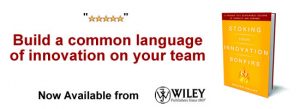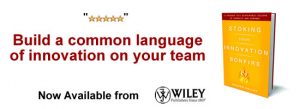Be Competitively Unpredictable!
 Competitively unpredictable: two words that spell the key to success in today’s fast paced, highly competitive business arena.
Competitively unpredictable: two words that spell the key to success in today’s fast paced, highly competitive business arena.
If your company has the ability to consistently outmaneuver the competition in ways they never see coming, then the future is bright. If, on the other hand, your attempts at innovation are humdrum and highly predictable, you will be the corporate equivalent of Wile E. Coyote, doomed to forever chasing the more nimble, faster Road Runner without success.
Why is being competitively unpredictable so essential now? One key reason is the ever-shrinking window of opportunity. In the past decades, depending on your industry, you could count on having three or five or even seven years after bringing something new to market to make good money before you needed to come up with the next new thing to keep revenues growing.
This is no longer the case. While the pace of innovation used to be fast, it was still manageable. Now the window of opportunity is getting shorter and closing faster so you’re forced to innovate ever more rapidly. One of the best examples is the mobile phone industry, where they are now counting in months, not years, between new product introductions.
This also makes timing a key element of innovation as you need to hit the market at the right time – not too late, but not too early either – with the right offering or you fall behind your competitors, being forced to go in directions they dictate rather than charting your own future.
At the same time that the window of opportunity is narrowing, competition overall is becoming more and more unpredictable. Your competitors are using open innovation to uncover more market opportunities and the results are starting to show. And new competitors are coming out of nowhere and perhaps from different industries to completely disrupt your market and destabilize your industry.
The book industry is a great example here. No one really expected Amazon to become such a disruptive force as they have turned out to be. First, they hit the book selling industry, putting major chains like Borders out of business and prompting many independent booksellers to close as well. That was amazing enough but founder Jeff Bezos had much bigger plans in mind. Now the company is not just the world’s biggest online retailer of books but the biggest online retailer, period, offering everything imaginable, from software and electronics to furniture, food, clothing, home goods, and drug store items. Competitors like WalMart are fighting to keep up with the ease of online shopping and attractive pricing Amazon.com offers. The next disruptive move for Amazon might be in data management.
With companies being able to morph off into new business areas much more quickly than ever before, your objective is to become one of the competitively unpredictable companies, rather than a victim of competitive unpredictability.
Here’s the bad news: We lack visionary innovation executives, leaders and champions to make this happen. Too often, they are playing catch up, chasing the competition rather than making their own organizations competitively unpredictable through innovation not just in products and services but also in business processes, delivery channels and business models. Based on interactions I’ve had with companies around the world, here is why I think this is the case:
• They do not innovate on the innovation process…
Although many companies are moving in the right direction with an increased focus on open innovation and business model innovation, I still see too many innovation leaders who are stuck because they do not develop themselves and their teams.
One key reason is that they are not experimenting (enough) with ways in which they can innovate on the innovation process itself. At times, I even meet corporate innovation teams that have not even heard about open innovation. This is quite shocking to me and it leads me to my next point.
• They do not develop their mindset and toolbox…
Occasionally, every member of a corporate innovation team, especially the leaders, needs to take a hard look in the mirror and ask these two questions: Do I have the right mindset, the knowhow and the toolbox needed to lead my company’s efforts for innovation in times like this? The next question is even more important: Do I have a process that keeps me up updated on the innovation trends and practices that my company needs to embrace to beat the competition?
I don’t think that corporate innovators get complacent as such. They are just too busy getting things done and they do not set aside the time needed to invest in themselves. This becomes quite obvious at my sessions where I often ask how often they just sit back and reflect on the work they are doing and the challenges they face. Not many people at all have this time for reflection.
This is poor decision-making with regards to prioritizing one’s time, and it will hurt you in the long run.
• They lack the courage to speak up…
Do you have the courage to tell the truth (and perhaps risk your job) when you can see that your company is moving in the wrong direction with your innovation efforts? Or do you just accept things are they are?
This one is difficult as corporate innovation teams often operate in organizations that are political to a lesser or higher degree. Sometimes you need a more subtle approach, but you must never lose your courage to speak up when things move in the wrong direction.
• They lack communication skills and efforts…
Most corporate innovation teams that I work with buy into the idea that their key role is to facilitate in a way that helps innovation take root at the business units and to integrate external resources into the innovation process.
This is a good thing, but they do not realize the importance of communication related to these challenges. They need to have on-going conversations with internal as well as external stakeholders if they want to succeed as innovation facilitators and integrators and too many fail on this.
Other Challenges
In some companies, innovation leaders are fighting a battle that has nothing to do with the shortcomings listed above. This is a battle that will sound familiar to many of you. On one side, we find a visionary innovation leader and a strong innovation team. This leader and his team have a vision and the ideas that can bring long-term prosperity to the company if they are executed well – and given the time to do so.
On the other side, we have a CFO, who has been given the mandate to cut down on costs. This is fair enough in tough times, but the problem is that the CFO and his allies do not really know much about innovation. They cut too deep. They lose their patience. No wonder. You get immediate results by cutting costs and – if successful – you have to wait for a while to see the results of innovation. If you don’t know how innovation works, this becomes a no-brainer.
The judge is the CEO. Or is it? Not really, because the owners (the board) judges the CEO and in sluggish economic times like these what matters are short-term results. Heck, in many companies you even have a short-term focus when the economy is doing well. The key problem is that no one really judges the board. You could argue that market does so, but in such cases the blame hits the CEO, not the board. You are stuck with the board.
No one wins this battle. The employees are taken as hostages, the customers or end-users lose out on the benefits of innovation and in the long term the shareholders will suffer. The latter is true because there is actually one winner. That is the competitor that decides to become competitively unpredictable through innovation and gets this right.
The challenges I’ve outlined here are tough to overcome. They require having a smart innovation strategy, something many companies lack. You’ll also need the right culture and people in place, along with a structure for pursuing innovation that supports the goal of being competitively unpredictable. In fact, you may need to completely rethink how your business pursues innovation. This is hard work. But if you succeed and become truly competitively unpredictable, the rewards will be many and long-lasting. And given the pace of change, what other choice do you really have?
image credit: surprised businessman image from bigstock

Wait! Before you go…
Choose how you want the latest innovation content delivered to you:
- Daily — RSS Feed — Email — Twitter — Facebook — Linkedin Today
- Weekly — Email Newsletter — Free Magazine — Linkedin Group
 Stefan Lindegaard is an author, speaker and strategic advisor who focus on the topics of open innovation, social media and intrapreneurship.
Stefan Lindegaard is an author, speaker and strategic advisor who focus on the topics of open innovation, social media and intrapreneurship.
NEVER MISS ANOTHER NEWSLETTER!
LATEST BLOGS
The Evil Downside of Gift Cards
This past holiday season I saw probably one too many articles trumpeting the value of gift cards to retailers and how they are a great thing for retailers. My skeptic side starts coming out as I see article after article appear, and I have to start asking “Is the increasing prevalence of gift cards as a holiday gift (primarily Christmas) a good thing for retailers?”
Read MoreWhy the iPhone will not succeed – Yet
The new Apple iPhone is set to launch on June 29, 2007 and the press and investors are making it a darling. Investors have run Apple’s stock price up from about $85 per share before its announcement to $125 per share recently, but the iPhone still will not succeed – at least not yet.
Read More



Really interesting, Stefan thanks ​!
​I think you’ll be very much interested in this list of emerging Open Innovation research:https://www.openinnovation.eu/07-05-2013/768/